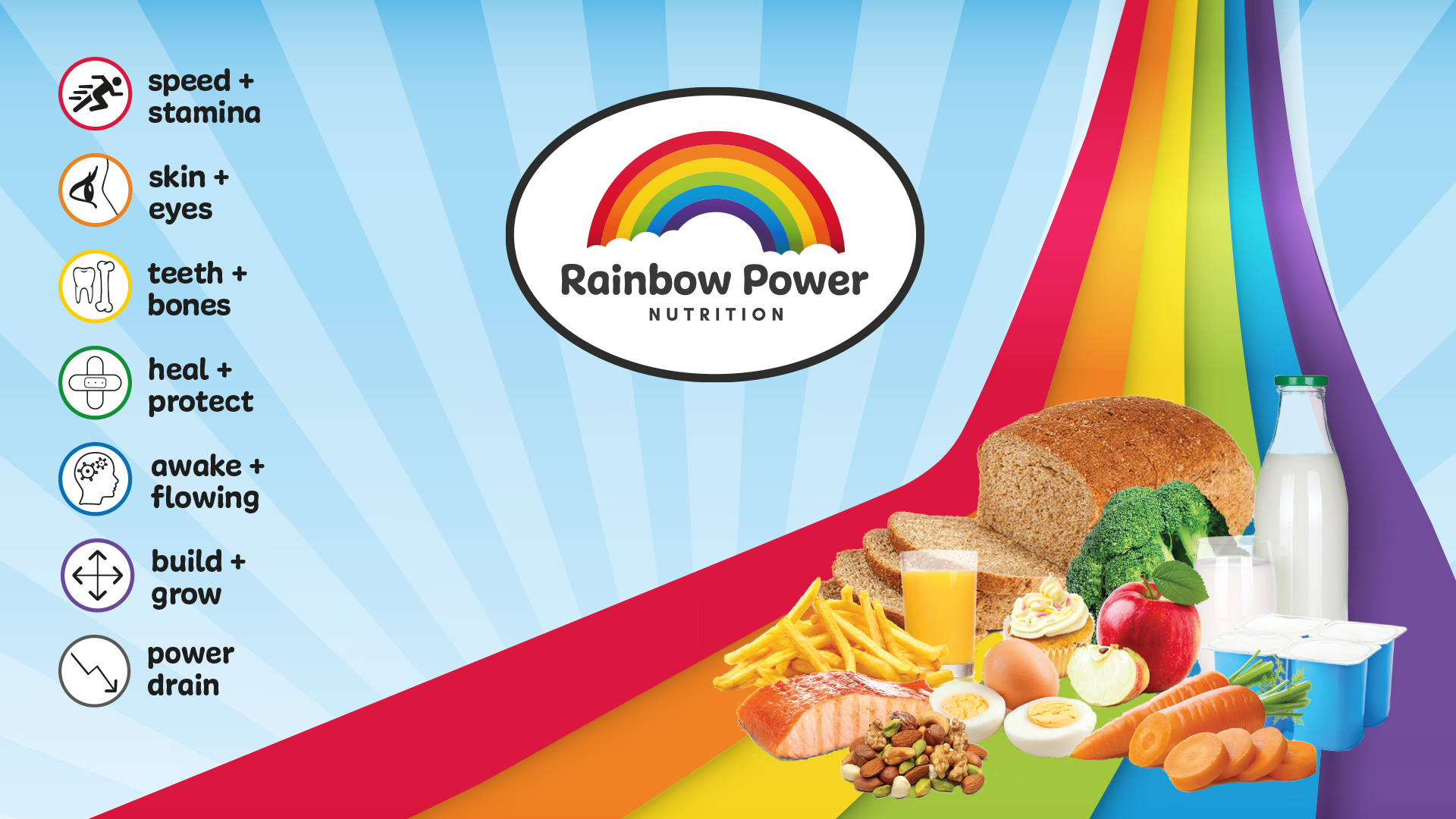
About Rainbow Power Nutrition
Playing cards and other resources coming soon!
You need nutrients from food and drinks to super power your body. Some foods are packed FULL of powers, but others don't have as many. With Rainbow Power Nutrition, you need to power up the whole rainbow to be healthy. The way to do this is to eat a varied diet with the right balance of food groups, and to not have too much power drain from fat, salt or sugar.
With Rainbow Power Nutrition, even if only one power is low, it will make the rest of the powers start to drain because they all work together to keep you healthy.
This page goes into more detail about Rainbow Power Nutrition, but playing cards and other resources are coming soon.
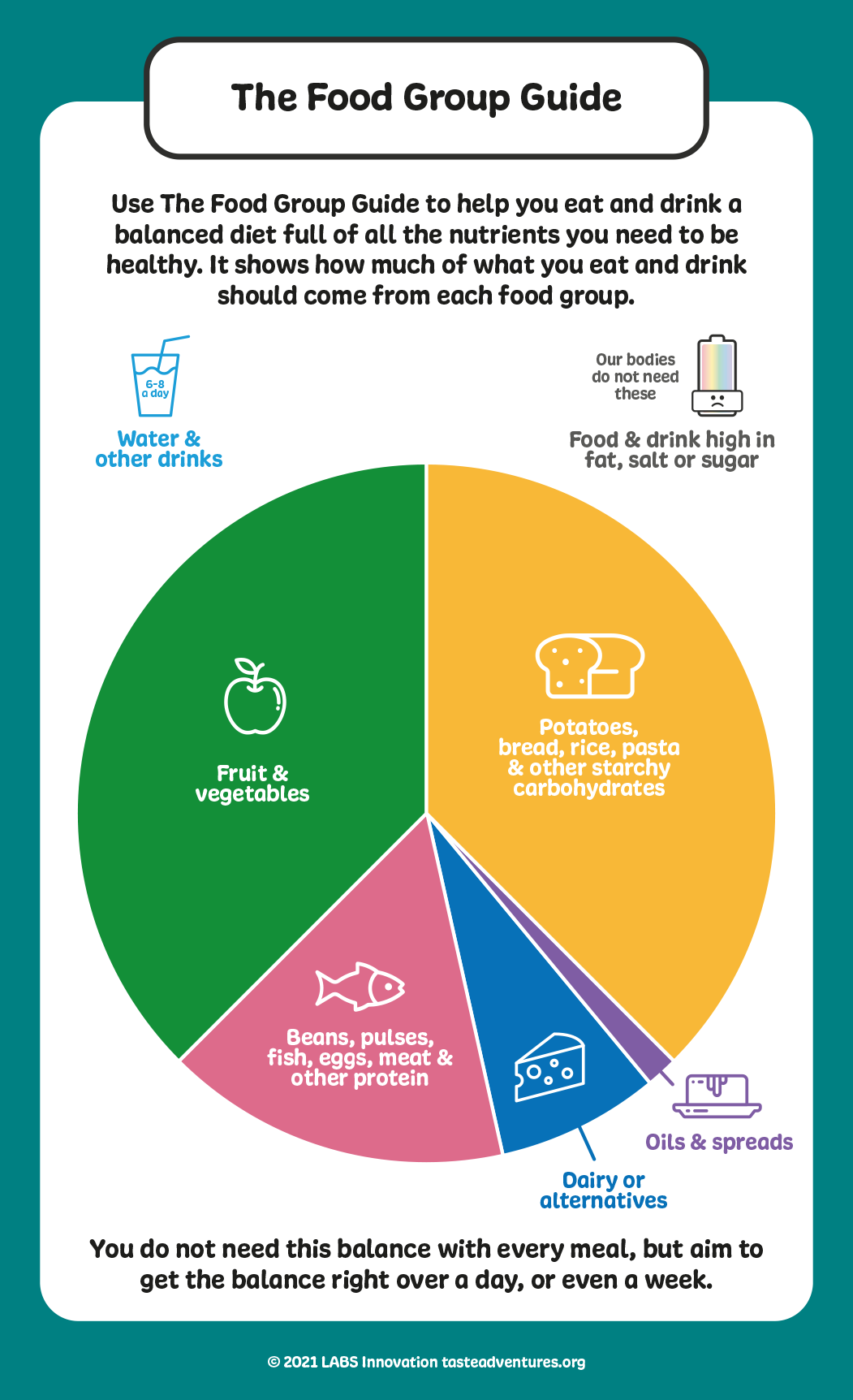
The Food Group Guide
Macronutrients and micronutrients
Your body needs a mixture of different nutrients to be healthy, and these can be described as macronutrients and micronutrients.
Macronutrients (Macro means large, so you need lots of these)
- Carbohydrates provide you with energy for your body.
- Dietary fibre is another name for non-digestible carbohydrates, and it's important for keeping you healthy.
- Protein gives you amino acids so you can grow and maintain your body, and also gives you energy.
- Fat gives you important fatty acids and energy. You need small amounts for your body to function, and also to help you absorb fat soluble vitamins.
Micronutrients (Micro means tiny, so you only need small amounts of these)
- Vitamins and minerals are really important. You only need small amounts, but they are essential for many body functions.
Water is also really important and helps all your body processes.
If you eat a varied diet, with the right mixture of food groups, you should get enough of all these nutrients.
Food groups and nutrition
Eating a balanced diet
In the UK, many of us are familiar with the Eatwell Guide (previously known as the Eatwell Plate). This balance of foods is what the government, NHS and schools suggest when educating people about healthy diets. The Food Group Guide shown here is based on this guidance.
However, even though people know what they should eat, many of us still don't get the balance right. Lots of people have micronutrient deficiencies, which means they don't get enough of a vitamin or a mineral, and it makes them poorly.
So, how do you choose foods to eat that are packed full of powerful micronutrients? If you have different options within a food group, how do you pick the most micronutrient-rich choice?
Rainbow Power Nutrition is the answer! I went through the nutrition database that the UK government uses for its food survey, and pulled out the nutritional information for many common foods and drinks. I then explored the data and looked for patterns, read endless research papers, and worked with a nutritionist (thanks Marissa!) to capture the roles of different nutrients ...and to cut a long and very dull and data and evidence driven story, I have now rated these foods out of 10 for each rainbow power.
This means you can now directly compare the Rainbow Power Nutrition content of a wide variety of foods. Let's find out about the rainbow powers...
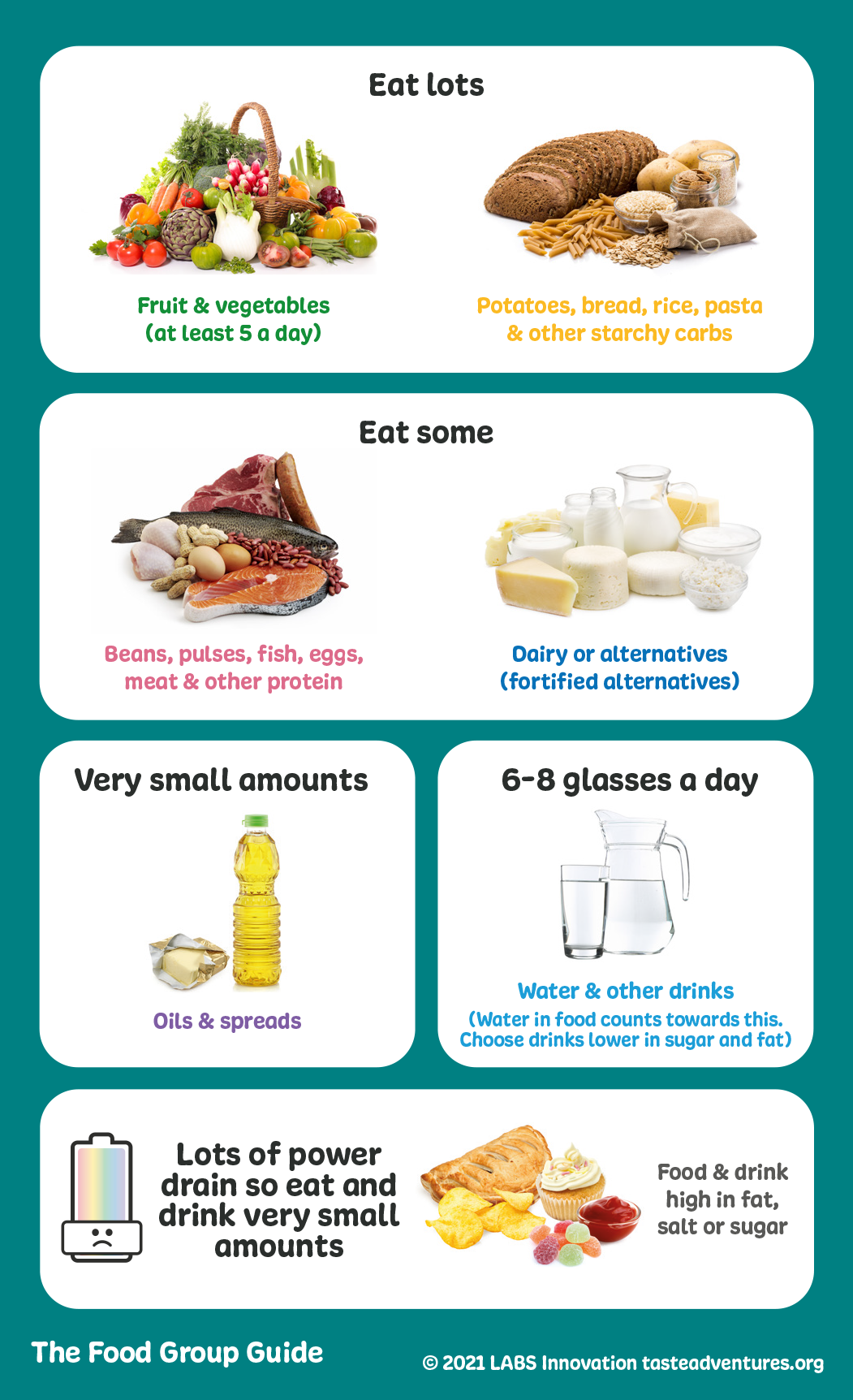
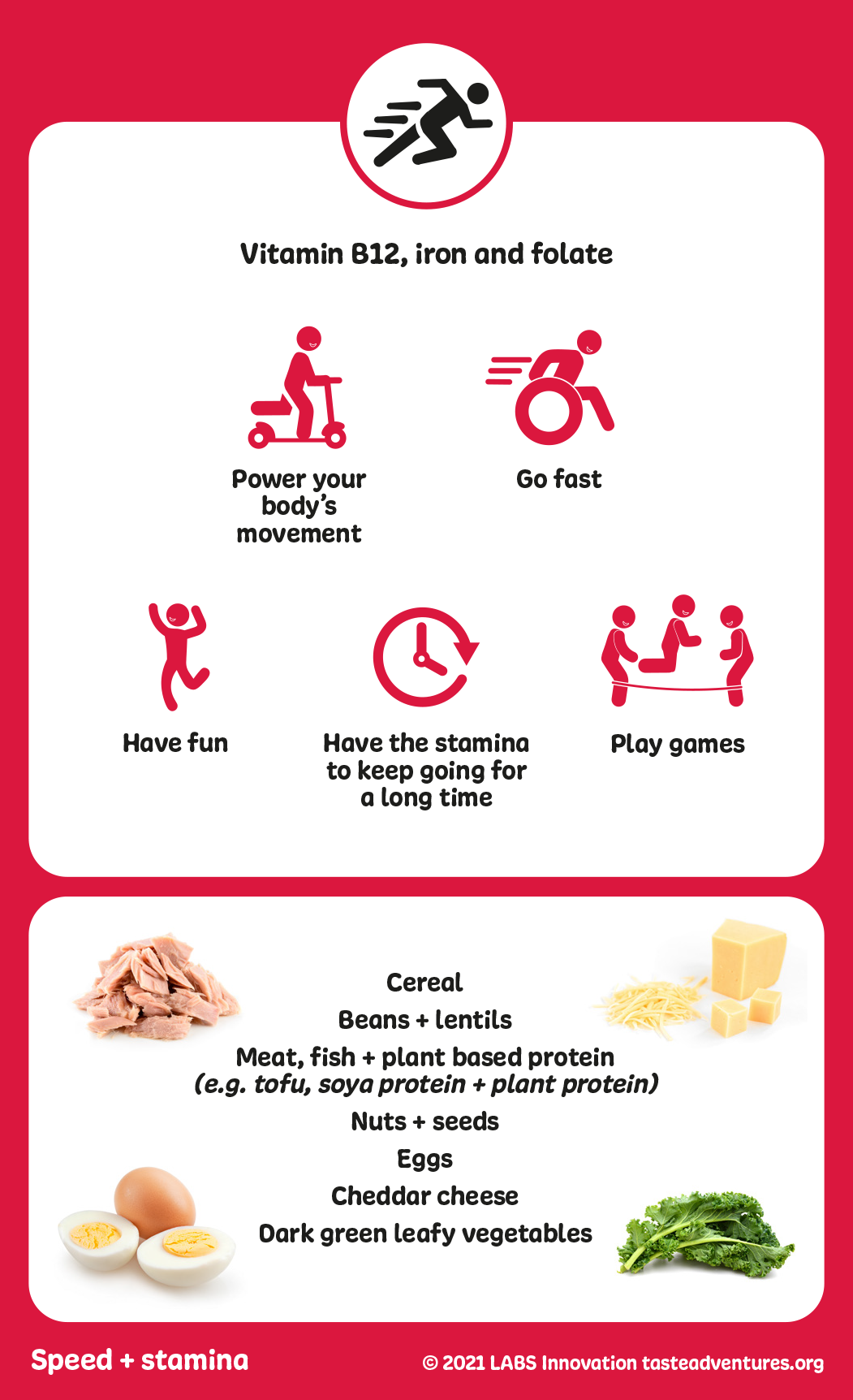
Speed and stamina
Vitamin B12, iron and folate
Iron, folate and B12 all work together to help oxygen go around your body which means when you're active it can help you go faster and play for longer.
Iron helps to carry the oxygen in the blood from the lungs to your tissues, which then gives you the energy to do your activities. In the middle of your bones you have bone marrow, and this is where 80% of your body’s iron is found. It waits there ready to make red blood cells, and it is their job to then carry the oxygen around the body.
Folate and B12 are both needed for the function of DNA and RNA. It is their job to copy our genes, and is why we look a little bit like our blood relatives, as the information in our genes and is passed down through our families through these genes. B12 helps your immune system work and stop you getting poorly. It also helps to stop you getting tired by helping your body convert the food you eat into glucose which gives you energy.
Skin and eyes
Vitamin A
90% of the vitamin A in your body is stored in the liver and when you need it, the liver lets it go to all the tissues that want it.
The main role of vitamin A is to keep your eyes healthy. It stops them from getting dry so you can keep your eyes open, and if you didn't have enough you wouldn't be able to see in the dark.
It also plays an important role in helping your immune system function well.
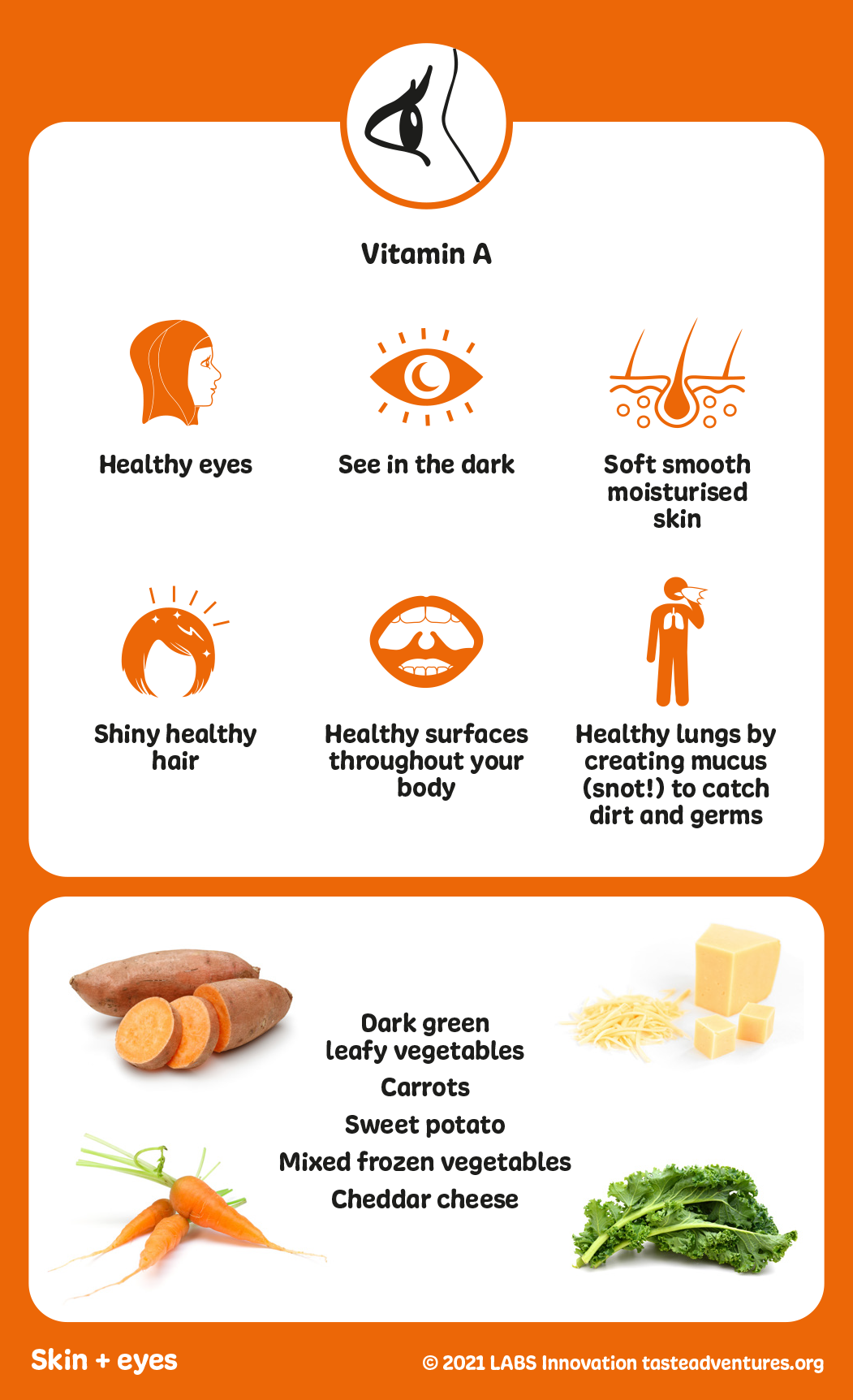
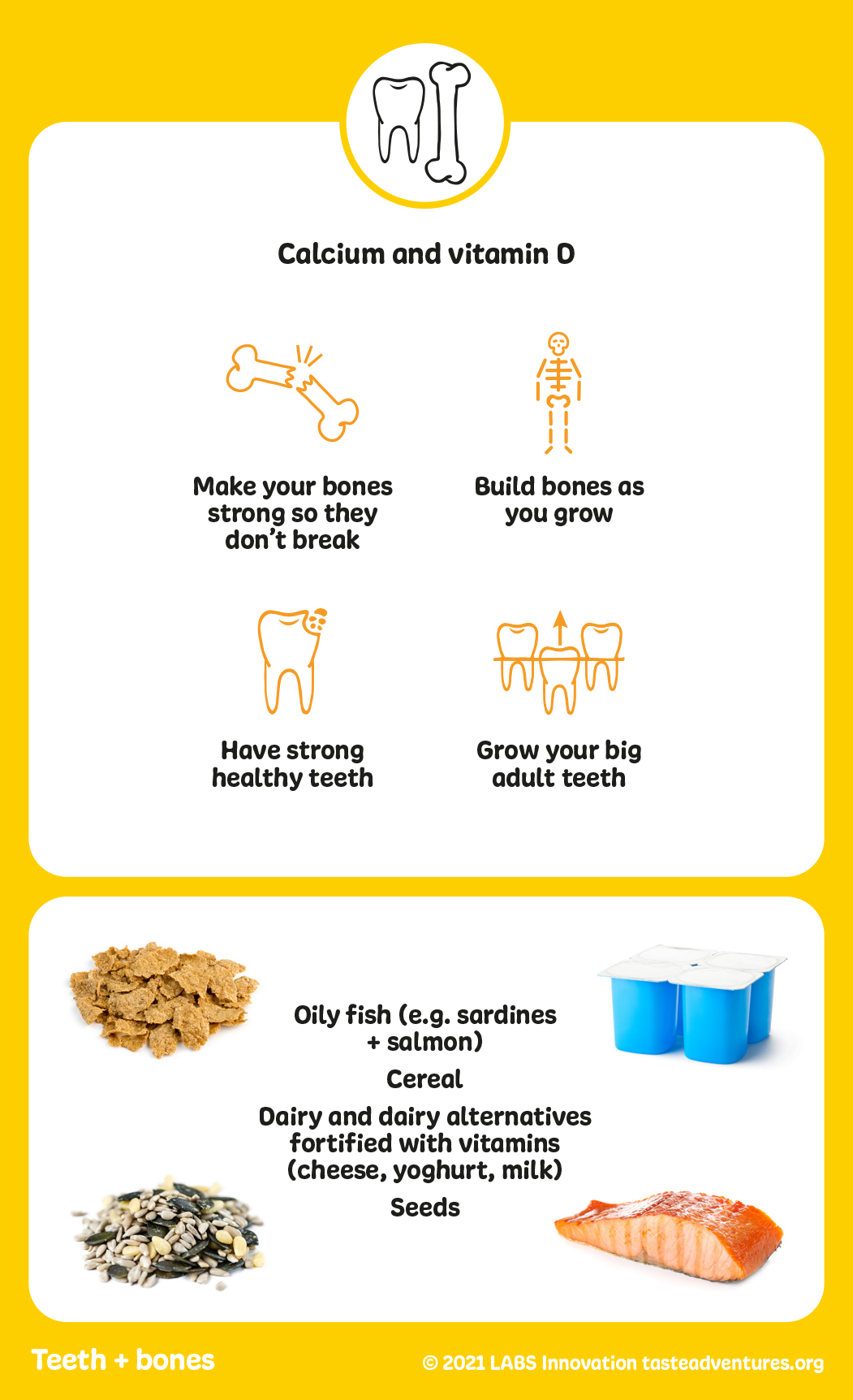
Teeth and bones
Calcium and vitamin D
Calcium and vitamin D work together. Calcium helps to build your bones, whilst vitamin D helps your bones absorb the calcium the bones need. It is important for you to have calcium as throughout your childhood your bones and teeth are developing, meaning your teeth become stronger and you become taller.
Calcium - approximately 99% of calcium is stored in your teeth and bones, so it runs through your whole skeleton; the other 1% is in your tissues. Calcium gives your bones the strength it needs to carry your body, and makes your teeth strong so you can eat food.
Vitamin D - is different from all the other vitamins because as well as getting vitamin D from some foods, your body can create vitamin D from sunshine. You only need a little sun, though, so don't stay out too long on sunny days without protection or you will damage your skin.
Heal and protect
Vitamins C, K, E and zinc
If you fall over and cut your knee these nutrients help you heal. Also, if you get poorly, they help your body fight the bugs that were making you feel ill.
Vitamin C helps to heal wounds, protect cells and supports your immune system to fight bugs.
Vitamin K is essential for blood clotting, helps with bone healing and body repair.
Vitamin E repairs damaged hair and helps with the function of the immune system.
After iron, zinc is the 2nd most rich mineral in the body. 60% of zinc is in our muscles and 30% of it is in our bones. It supports the immune system and the creation of new cells. It has lots of other roles, it helps your brain and muscles develop and helps with the function of your bones, so it plays an important role in your development and growth. Zinc also helps your taste buds develop so it helps you taste the different flavours of foods. It also helps your fingernails grow.
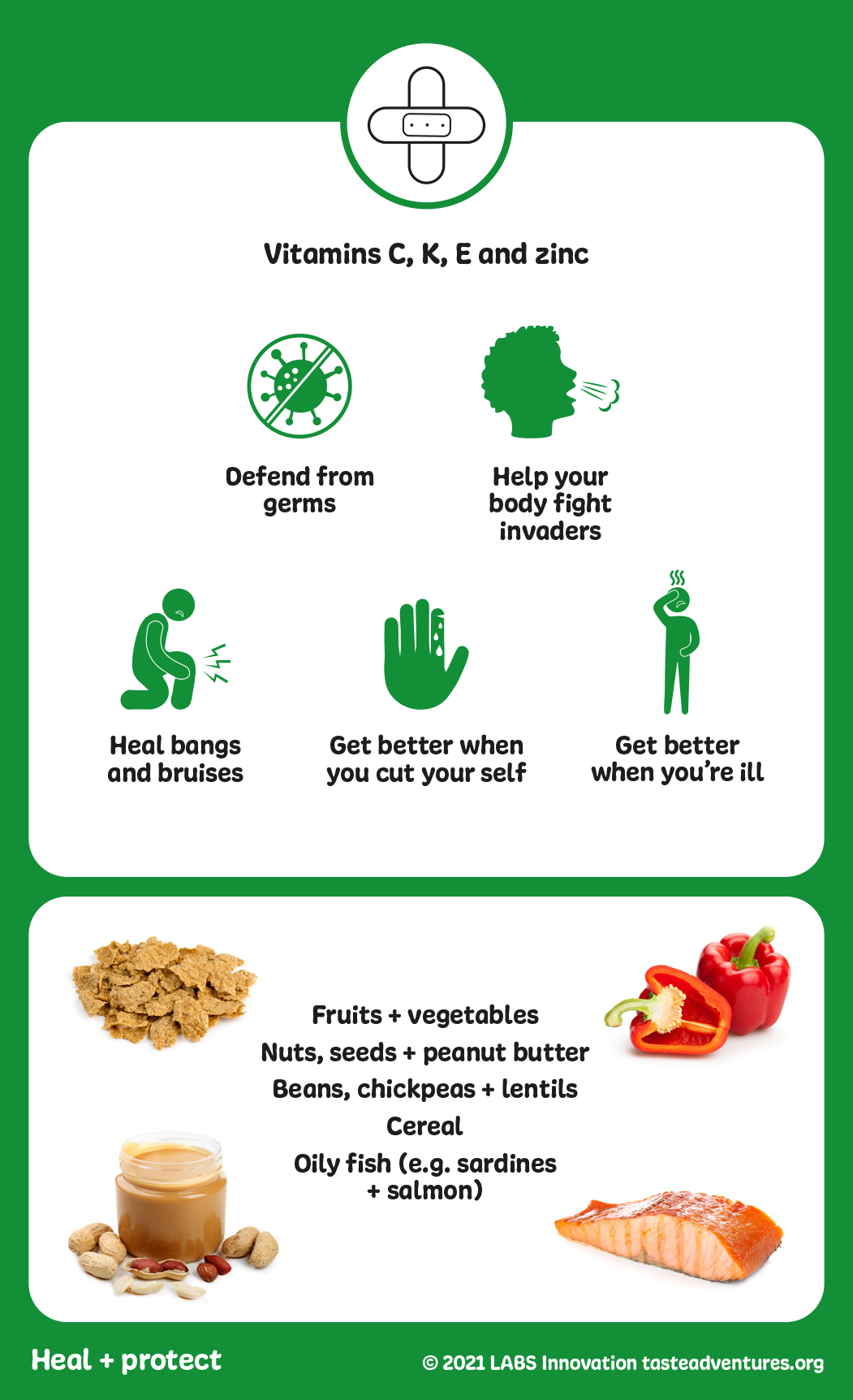
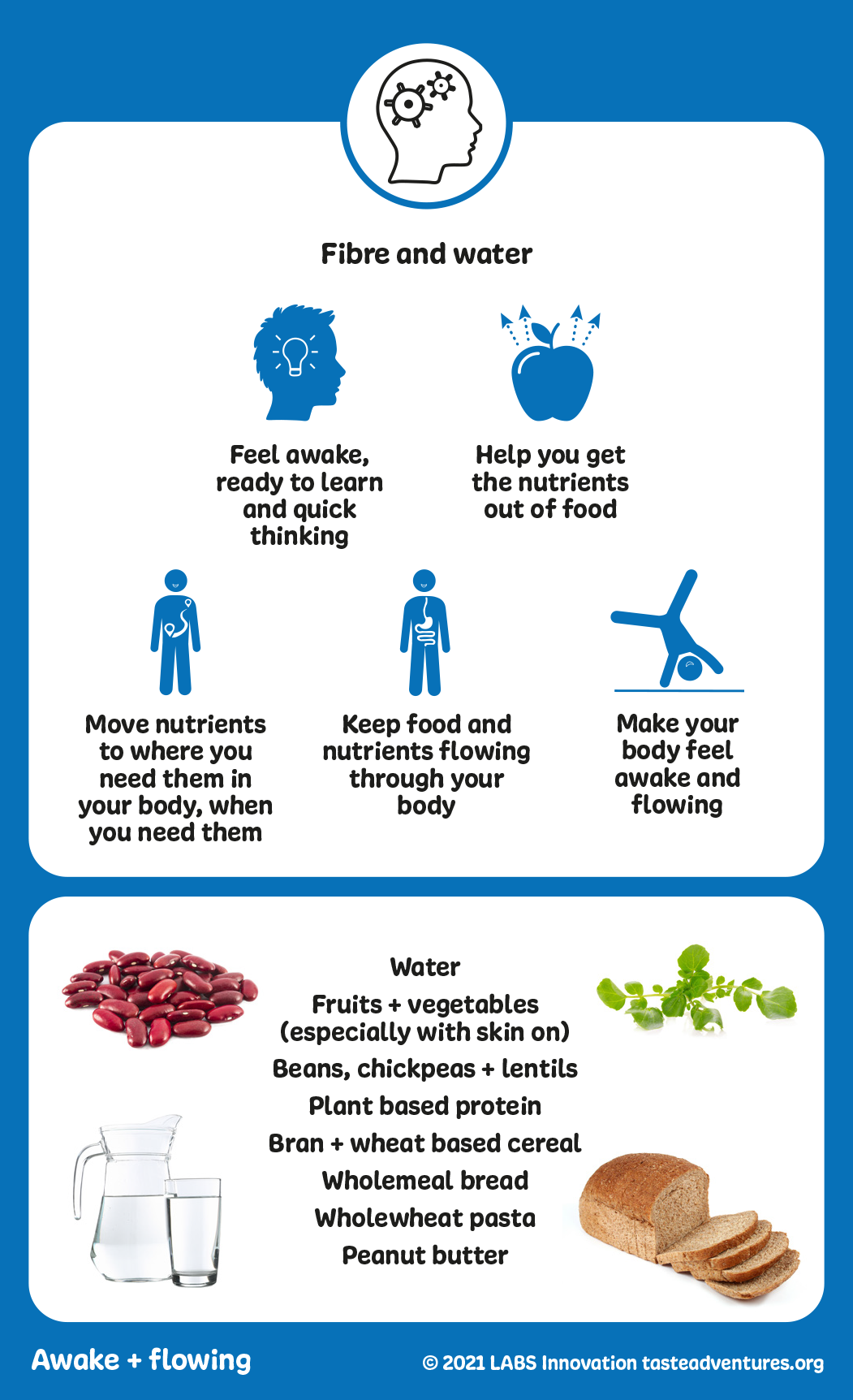
Awake and flowing
Fibre and water
Fibre and water work together to help you get the nutrients out of food, and transport them to where you need them in your body. They also help flush all the waste through your body.
Fibre - Dietary fibre has a very important role to play within your body. Its job is to help your digestive system move all the foods you eat through your body, down through a long digestive tract where it removes all the nutrients from the foods, and then helps to move the waste material out of your body when you go to the toilet.
Water - Your body is made up of around 70% water because everything in your body needs water. Your brain needs it so you can think clearly and feel less tired. Your muscles need it so you can be energised when exercising. Your heart, liver, kidneys and lungs all need water to work well, and even your skin benefits from water. In children, water is even more important as it helps to control your body temperature which helps to stop you getting too hot or too cold. There are lots of ways our bodies lose water, through exercising, through breathing, when we go to the toilet and if you cry.
Build and grow
B vitamins
B vitamins work together to convert food into energy which you need to grow, build tissues and power your body.
Each B vitamin has a different role and between them they make sure your cells work properly. They create new blood cells, keep your skin cells, brain cells, eyes, other body tissues and nervous system healthy, and help your hair grow.
The B vitamins in build and grow power include Thiamin (B1), Riboflavin (B2), Niacin (B3), Pyridoxine (B6), Folate, Vitamin B12, Pantothenic acid and Biotin.
Vitamin B12 and folate are B vitamins too, but they are included in red power because they play an important role in your speed and stamina.
B vitamins are water soluble which means your body cannot store them, so you need to eat them in your diet daily.
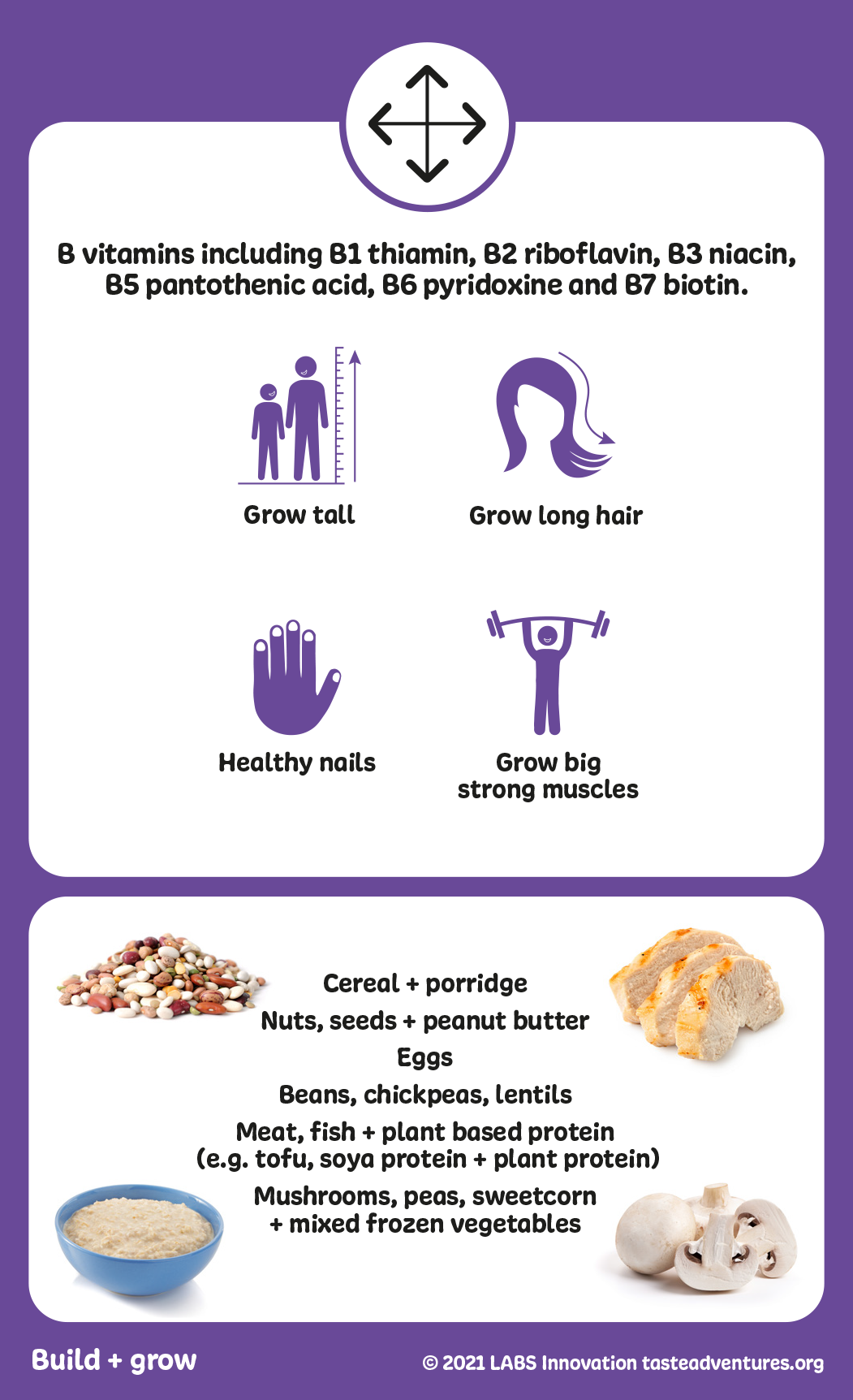
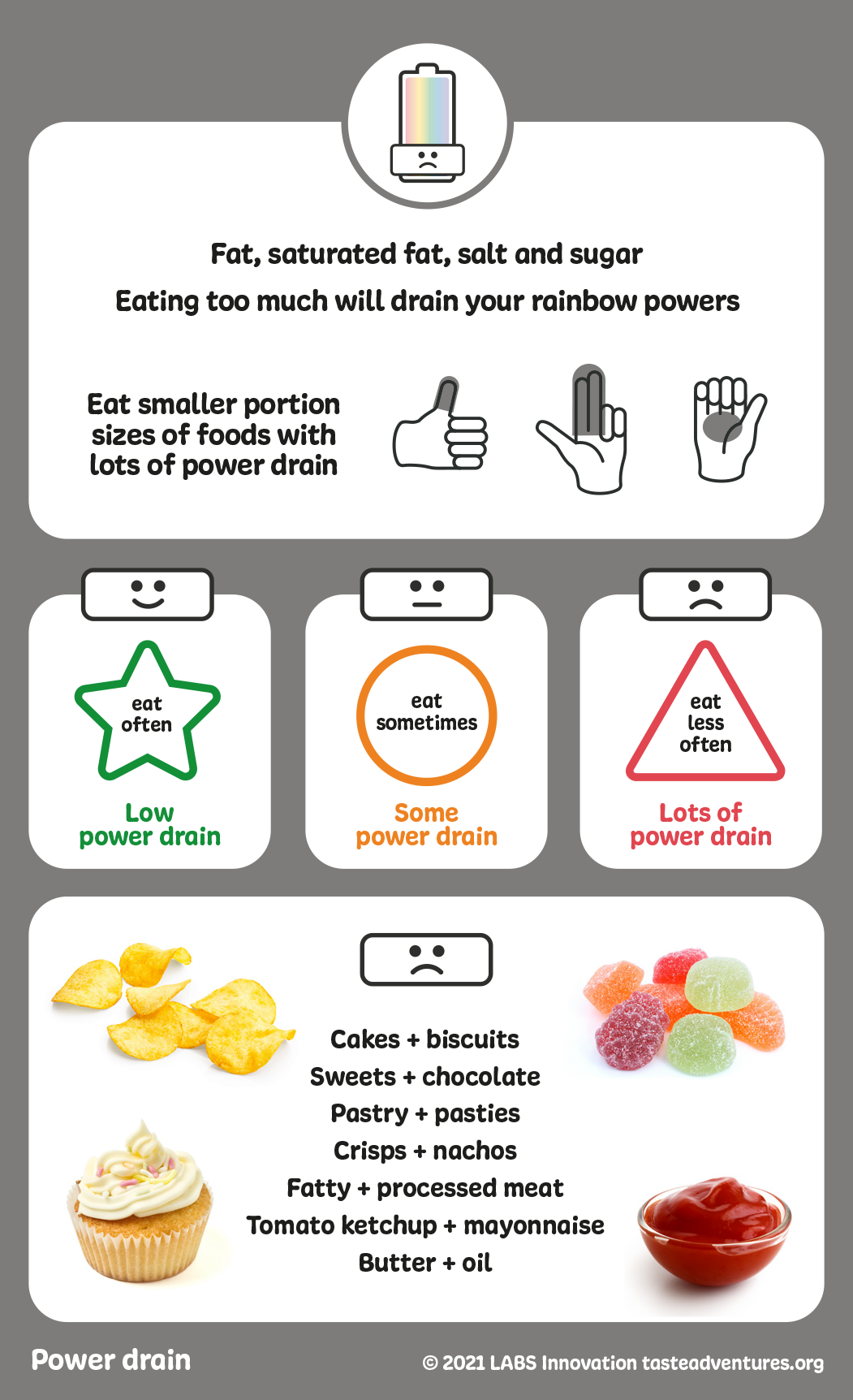
Power drain
Fat, saturated fat, salt and sugar
I've rated foods based on how much fat, saturated fat, salt and sugar they contain. I've called this "power drain". I have used the traffic light labelling system used by the UK government for the thresholds.
- Green low in power drain and you can eat them often (happy face).
- Amber medium amount of power drain and you should eat them sometimes (neutral face).
- Red lots of power drain you should eat small amounts of them, and less often (sad face).
Fats are nutrients that are found in foods that the body uses to build nerve tissue and hormones. The body also uses fats as fuel for energy, and if they aren’t burned off as energy, they can be stored in your fat cells. These fats can either be used later on when you need them, or will stay as fat.
Some fats are healthy and you need small amounts of them, but some fats are unhealthy. Unsaturated fats are healthier and help you grow and develop, and children need fats in their diet to help their brains and nervous systems work. Fats also help absorb the four fat soluble vitamins which are called A, D, E and K.
Cholesterol is in every cell in your body and you need it for your brain, skin and organs. Cholesterol floats around your body in your blood, so eating too much saturated fat can get into the walls of your blood vessels which can make them narrower so the blood can’t get through, and it can get clogged up.
Sugar is added to foods to make them taste nicer, and your body can use it for energy. Foods that are high in sugar are often low in vitamins so don't give you much rainbow power, and too much sugar can make your teeth bad. Your body doesn't need sugar, and too much is unhealthy, so you should avoid having too much.
Salt is hidden in lots of foods. The role of salt is to balance the fluids in your body. It stops your blood pressure from getting to low, and helps to balance sugar levels in the blood. If you don’t have enough it can cause your muscle to cramp. If you have too much it can make your blood pressure go too high. You only need tiny amounts of salt in your diet, and is already in many foods you eat, so you don't need to add it to your food.
The Food Group Guide
Macronutrients and micronutrients

Your body needs a mixture of different nutrients to be healthy, and these can be described as macronutrients and micronutrients.
Macronutrients (Macro means large, so you need lots of these)
- Carbohydrates provide you with energy for your body.
- Dietary fibre is another name for non-digestible carbohydrates, and it's important for keeping you healthy.
- Protein gives you amino acids so you can grow and maintain your body, and also gives you energy.
- Fat gives you important fatty acids and energy. You need small amounts for your body to function, and also to help you absorb fat soluble vitamins.
Micronutrients (Micro means tiny, so you only need small amounts of these)
- Vitamins and minerals are really important. You only need small amounts, but they are essential for many body functions.
Water is also really important and helps all your body processes.
If you eat a varied diet, with the right mixture of food groups, you should get enough of all these nutrients.
Food groups and nutrition
Eating a balanced diet

In the UK, many of us are familiar with the Eatwell Guide (previously known as the Eatwell Plate). This balance of foods is what the government, NHS and schools suggest when educating people about healthy diets. The Food Group Guide shown here is based on this guidance.
However, even though people know what they should eat, many of us still don't get the balance right. Lots of people have micronutrient deficiencies, which means they don't get enough of a vitamin or a mineral, and it makes them poorly.
So, how do you choose foods to eat that are packed full of powerful micronutrients? If you have different options within a food group, how do you pick the most micronutrient-rich choice?
Rainbow Power Nutrition is the answer! I went through the nutrition database that the UK government uses for its food survey, and pulled out the nutritional information for many common foods and drinks. I then explored the data and looked for patterns, read endless research papers, and worked with a nutritionist (thanks Marissa!) to capture the roles of different nutrients ...and to cut a long and very dull and data and evidence driven story, I have now rated these foods out of 10 for each rainbow power.
This means you can now directly compare the Rainbow Power Nutrition content of a wide variety of foods. Let's find out about the rainbow powers...
Speed and stamina
Vitamin B12, iron and folate

Iron, folate and B12 all work together to help oxygen go around your body which means when you're active it can help you go faster and play for longer.
Iron helps to carry the oxygen in the blood from the lungs to your tissues, which then gives you the energy to do your activities. In the middle of your bones you have bone marrow, and this is where 80% of your body’s iron is found. It waits there ready to make red blood cells, and it is their job to then carry the oxygen around the body.
Folate and B12 are both needed for the function of DNA and RNA. It is their job to copy our genes, and is why we look a little bit like our blood relatives, as the information in our genes and is passed down through our families through these genes. B12 helps your immune system work and stop you getting poorly. It also helps to stop you getting tired by helping your body convert the food you eat into glucose which gives you energy.
Skin and eyes
Vitamin A

90% of the vitamin A in your body is stored in the liver and when you need it, the liver lets it go to all the tissues that want it.
The main role of vitamin A is to keep your eyes healthy. It stops them from getting dry so you can keep your eyes open, and if you didn't have enough you wouldn't be able to see in the dark.
It also plays an important role in helping your immune system function well.
Teeth and bones
Calcium and vitamin D

Calcium and vitamin D work together. Calcium helps to build your bones, whilst vitamin D helps your bones absorb the calcium the bones need. It is important for you to have calcium as throughout your childhood your bones and teeth are developing, meaning your teeth become stronger and you become taller.
Calcium - approximately 99% of calcium is stored in your teeth and bones, so it runs through your whole skeleton; the other 1% is in your tissues. Calcium gives your bones the strength it needs to carry your body, and makes your teeth strong so you can eat food.
Vitamin D - is different from all the other vitamins because as well as getting vitamin D from some foods, your body can create vitamin D from sunshine. You only need a little sun, though, so don't stay out too long on sunny days without protection or you will damage your skin.
Heal and protect
Vitamins C, K, E and zinc

If you fall over and cut your knee these nutrients help you heal. Also, if you get poorly, they help your body fight the bugs that were making you feel ill.
Vitamin C helps to heal wounds, protect cells and supports your immune system to fight bugs.
Vitamin K is essential for blood clotting, helps with bone healing and body repair.
Vitamin E repairs damaged hair and helps with the function of the immune system.
After iron, zinc is the 2nd most rich mineral in the body. 60% of zinc is in our muscles and 30% of it is in our bones. It supports the immune system and the creation of new cells. It has lots of other roles, it helps your brain and muscles develop and helps with the function of your bones, so it plays an important role in your development and growth. Zinc also helps your taste buds develop so it helps you taste the different flavours of foods. It also helps your fingernails grow.
Awake and flowing
Fibre and water

Fibre and water work together to help you get the nutrients out of food, and transport them to where you need them in your body. They also help flush all the waste through your body.
Fibre - Dietary fibre has a very important role to play within your body. Its job is to help your digestive system move all the foods you eat through your body, down through a long digestive tract where it removes all the nutrients from the foods, and then helps to move the waste material out of your body when you go to the toilet.
Water - Your body is made up of around 70% water because everything in your body needs water. Your brain needs it so you can think clearly and feel less tired. Your muscles need it so you can be energised when exercising. Your heart, liver, kidneys and lungs all need water to work well, and even your skin benefits from water. In children, water is even more important as it helps to control your body temperature which helps to stop you getting too hot or too cold. There are lots of ways our bodies lose water, through exercising, through breathing, when we go to the toilet and if you cry.
Build and grow
B vitamins

B vitamins work together to convert food into energy which you need to grow, build tissues and power your body.
Each B vitamin has a different role and between them they make sure your cells work properly. They create new blood cells, keep your skin cells, brain cells, eyes, other body tissues and nervous system healthy, and help your hair grow.
The B vitamins in build and grow power include Thiamin (B1), Riboflavin (B2), Niacin (B3), Pyridoxine (B6), Folate, Vitamin B12, Pantothenic acid and Biotin.
Vitamin B12 and folate are B vitamins too, but they are included in red power because they play an important role in your speed and stamina.
B vitamins are water soluble which means your body cannot store them, so you need to eat them in your diet daily.
Power drain
Fat, saturated fat, salt and sugar

I've rated foods based on how much fat, saturated fat, salt and sugar they contain. I've called this "power drain". I have used the traffic light labelling system used by the UK government for the thresholds.
- Green low in power drain and you can eat them often (happy face).
- Amber medium amount of power drain and you should eat them sometimes (neutral face).
- Red lots of power drain you should eat small amounts of them, and less often (sad face).
Fats are nutrients that are found in foods that the body uses to build nerve tissue and hormones. The body also uses fats as fuel for energy, and if they aren’t burned off as energy, they can be stored in your fat cells. These fats can either be used later on when you need them, or will stay as fat.
Some fats are healthy and you need small amounts of them, but some fats are unhealthy. Unsaturated fats are healthier and help you grow and develop, and children need fats in their diet to help their brains and nervous systems work. Fats also help absorb the four fat soluble vitamins which are called A, D, E and K.
Cholesterol is in every cell in your body and you need it for your brain, skin and organs. Cholesterol floats around your body in your blood, so eating too much saturated fat can get into the walls of your blood vessels which can make them narrower so the blood can’t get through, and it can get clogged up.
Sugar is added to foods to make them taste nicer, and your body can use it for energy. Foods that are high in sugar are often low in vitamins so don't give you much rainbow power, and too much sugar can make your teeth bad. Your body doesn't need sugar, and too much is unhealthy, so you should avoid having too much.
Salt is hidden in lots of foods. The role of salt is to balance the fluids in your body. It stops your blood pressure from getting to low, and helps to balance sugar levels in the blood. If you don’t have enough it can cause your muscle to cramp. If you have too much it can make your blood pressure go too high. You only need tiny amounts of salt in your diet, and is already in many foods you eat, so you don't need to add it to your food.